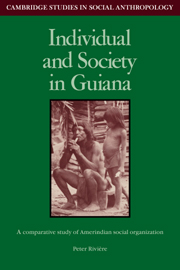Book contents
- Frontmatter
- Contents
- Acknowledgments
- 1 Peoples and approaches
- 2 The settlement pattern: size, duration, and distribution
- 3 Village composition
- 4 The categories of social classification
- 5 Aspects of social relationships
- 6 Autonomy and dependency
- 7 The individual in society
- 8 Guiana society and the wider context
- Notes
- Bibliography
- Index
- CAMBRIDGE STUDIES IN SOCIAL ANTHROPOLOGY
8 - Guiana society and the wider context
Published online by Cambridge University Press: 01 October 2009
- Frontmatter
- Contents
- Acknowledgments
- 1 Peoples and approaches
- 2 The settlement pattern: size, duration, and distribution
- 3 Village composition
- 4 The categories of social classification
- 5 Aspects of social relationships
- 6 Autonomy and dependency
- 7 The individual in society
- 8 Guiana society and the wider context
- Notes
- Bibliography
- Index
- CAMBRIDGE STUDIES IN SOCIAL ANTHROPOLOGY
Summary
This work started with an examination of the nature of the settlement in Guiana; its size, distribution, and duration. The choice of where to begin was partly dictated by the need to provide something concrete on which to build the description of social organization. In practice, it has not proved feasible to move far away from the settlement as representing one of the fundamental social units of the region. Despite the ephemerality of its existence and the fluidity of its membership, the settlement appears as a relatively stable unit in comparison with the families and individuals who form it at any one time. Indeed, it is membership in settlements that gives families and individuals their social credentials and access to the wealth of social relations. In studying the social composition of settlements our attention was drawn continuously to the equation between co-residence and kinship and the stated preference for settlement endogamy. These factors go hand in hand with a contrast between the security afforded by kin, co-residents, and insiders and the dangers represented by others, strangers, and outsiders. It is the role of the village leader to manage the network of relationships that constitutes his settlement, and his and the shaman's duty to represent it in dealings with the outside, visible or invisible. Politics, insofar as they deal with the practical arrangements of living, are concerned as much with the relationship between settlements as they are with internal governance. The institutions that act to maintain communication between settlements, and thus save them from the dangers of excessive isolation, do not threaten the autonomy of each settlement.
- Type
- Chapter
- Information
- Individual and Society in GuianaA Comparative Study of Amerindian Social Organisation, pp. 101 - 109Publisher: Cambridge University PressPrint publication year: 1984



